Workplace Grievance Letter
Dear [Recipient's Name],
I am writing to formally raise a workplace grievance regarding [brief description of the issue or incident]. I believe it is important to address this matter in order to maintain a healthy and productive work environment.
I have attempted to resolve this matter informally but have been unable to reach a satisfactory resolution. I kindly request that a formal investigation be conducted to address the issue and ensure that appropriate measures are taken to prevent its recurrence.
I appreciate your prompt attention to this matter and request that you keep me informed about the progress of the investigation. I am confident that addressing this grievance will contribute to a more positive and harmonious work environment for all employees.
Sincerely,
Landlord Grievance Letter
Dear [Landlord's Name],
I am writing to bring to your attention a series of ongoing issues concerning the property located at [property address]. Despite my previous attempts to address these matters verbally, they have not been resolved, and I believe it is necessary to formally raise a grievance.
The issues include [brief description of each issue, e.g., maintenance problems, safety concerns, etc.]. I kindly request that you take immediate action to rectify these problems and ensure that the property is maintained in a safe and habitable condition.
Please provide me with a timeline for when these issues will be addressed and resolved. Your prompt attention to these matters will greatly contribute to my satisfaction as a tenant.
Thank you for your understanding and cooperation.
Sincerely,
School Grievance Letter
Dear [Principal's Name],
I am writing to express my concern and raise a grievance regarding an incident involving [brief description of the incident] that occurred at [school name] on [date]. I believe it is important to address this matter to ensure the safety and well-being of all students.
I kindly request a formal investigation into the incident and urge the school to take appropriate actions to prevent similar occurrences in the future. It is my hope that this grievance will lead to positive changes that contribute to a safe and inclusive learning environment for all students.
I look forward to your prompt response and the steps that will be taken to address this matter.
Sincerely
Consumer Grievance Letter
Dear [Company/Organization Name],
I am writing to formally raise a grievance concerning a recent experience I had as a customer. On [date], I [briefly describe the issue, e.g., received a defective product, encountered poor customer service, etc.].
I kindly request a thorough investigation into this matter and a resolution that is fair and satisfactory. I believe that addressing this grievance will not only rectify my specific issue but also contribute to the improvement of your services and customer satisfaction.
I appreciate your attention to this matter and look forward to a prompt resolution.
Sincerely,
Professional Grievance Letter Regarding Workplace Issue
Subject: Formal Grievance Regarding Workplace Conduct
Dear [Manager/Supervisor Name],
I am writing to formally raise a grievance concerning an ongoing issue in the workplace. Specifically, [describe the issue clearly, e.g., repeated instances of unfair treatment, harassment, or policy violations].
Despite previous informal attempts to resolve this matter on [dates if applicable], the situation persists, causing [impact on work performance, well-being, or team dynamics].
I request a formal review of this matter and appropriate actions to ensure it is resolved in accordance with company policies. I am willing to provide any necessary documentation or participate in discussions to clarify the situation.
Thank you for your attention to this matter.
Sincerely,
[Your Name]
Grievance Letter About Unfair Treatment
Subject: Grievance Concerning Unfair Treatment
Dear [HR Manager/Department Head],
I am writing to bring to your attention a matter that I believe constitutes unfair treatment. On multiple occasions, I have experienced [specific incidents], which I believe violate company policy and workplace fairness standards.
I respectfully request a formal investigation into these occurrences and that steps be taken to prevent further instances. I am available to provide any supporting evidence or documentation as needed.
Thank you for your time and understanding.
Sincerely,
[Your Name]
Customer Grievance Letter
Subject: Complaint Regarding Service/Product
Dear [Customer Service Manager],
I am writing to formally lodge a complaint regarding [product/service] received on [date]. The issue encountered was [describe problem in detail, e.g., defective product, poor service, delayed delivery].
I request that this matter be addressed promptly, either through replacement, refund, or appropriate corrective measures. Please let me know the next steps and expected resolution timeline.
Thank you for your attention to this matter.
Sincerely,
[Your Name]
Grievance Letter Against Harassment
Subject: Formal Grievance: Workplace Harassment
Dear [HR Manager/Compliance Officer],
I am compelled to report an incident of harassment that occurred on [date(s)] involving [person’s name or position]. The behavior included [describe actions, comments, or events], which have created a hostile work environment.
I request immediate attention to investigate the matter and implement measures to ensure my safety and well-being. I am prepared to provide detailed accounts and evidence if necessary.
Thank you for handling this matter seriously and confidentially.
Sincerely,
[Your Name]
Grievance Letter Regarding Policy Violation
Subject: Grievance Concerning Policy Violation
Dear [Manager/HR Department],
I wish to formally report a concern regarding a violation of company policy that occurred on [date(s)]. Specifically, [describe the violation in detail].
I request that this matter be reviewed and appropriate corrective action taken to ensure adherence to company regulations. I am available to provide further information or documentation as required.
Thank you for your prompt attention.
Sincerely,
[Your Name]
Who Should Send a Grievance Letter
- Employees experiencing workplace issues or unfair treatment.
- Customers or clients dissatisfied with services or products.
- Students or participants raising concerns about institutional policies.
- Any individual seeking formal resolution to conflicts, harassment, or violations.
What a Grievance Letter Is and Why It’s Important
A grievance letter is a formal written communication used to report complaints, violations, or issues that require attention and resolution.
Purpose:
- Document issues clearly and professionally.
- Request formal action or investigation.
- Provide a record for accountability and follow-up.
- Help resolve conflicts or disputes in a structured manner.
Whom Should a Grievance Letter Be Addressed To
- Supervisors or direct managers.
- Human resources or compliance departments.
- Regulatory or governing bodies (if applicable).
- Customer service or company representatives for product/service complaints.
When Is a Grievance Letter Necessary
- Experiencing unfair treatment, harassment, or discrimination.
- Observing policy violations or unethical behavior.
- Receiving defective products or poor services as a customer.
- When previous informal complaints have failed to resolve the issue.
How to Write and Send a Grievance Letter
- Clearly identify the issue with specific details.
- Include dates, incidents, and affected parties.
- Maintain a professional and respectful tone.
- Request specific actions or resolutions.
- Attach supporting evidence if applicable.
- Send via formal channels: official email, postal mail, or internal reporting system.
Requirements and Prerequisites Before Sending a Grievance Letter
- Gather evidence: emails, documents, witness statements.
- Attempt informal resolution if company policy suggests.
- Know organizational policies and procedures.
- Understand the expected outcome or remedy.
- Maintain a professional demeanor throughout the process.
Formatting and Style Recommendations
- Length: 1–2 pages, concise and focused.
- Tone: professional, serious, and respectful.
- Wording: precise, objective, and factual.
- Style: structured with introduction, body, and conclusion.
- Mode: printed letter or official email depending on organizational preference.
After Sending a Grievance Letter: Follow-Up Actions
- Confirm receipt with HR or relevant department.
- Monitor response timelines according to company policy.
- Keep copies of all communications.
- Participate in investigations or meetings if requested.
- Maintain confidentiality as required.
Pros and Cons of Submitting a Grievance Letter
Pros:
- Provides formal documentation of issues.
- Initiates official review and resolution.
- Protects the rights of the sender.
Cons:
- May strain relationships temporarily.
- Risk of no immediate resolution.
- Could escalate tensions if not handled appropriately.
Tricks and Tips for Effective Grievance Letters
- Stick to factual, objective language.
- Avoid emotional or accusatory statements.
- Include clear evidence and examples.
- Request a specific action or outcome.
- Proofread for clarity and professionalism.
Common Mistakes to Avoid in Grievance Letters
- Vague descriptions without evidence.
- Using aggressive or inflammatory language.
- Sending to inappropriate recipients.
- Omitting key dates or details.
- Failing to follow up or track responses.
Elements and Structure of a Grievance Letter
- Subject/Heading: Clear statement of the grievance.
- Introduction: Brief context and purpose of writing.
- Details of Complaint: Specific incidents, dates, and parties involved.
- Impact: Explain the effect on the sender or environment.
- Request for Action: Desired resolution or steps to be taken.
- Closing: Thank the recipient and provide contact information.
- Attachments: Include supporting evidence if applicable.
Comparison With Other Complaint Methods
- Verbal Complaints: Less formal, may not create a record.
- Internal Reporting Systems: Often faster, but may require follow-up letters.
- Customer Feedback Forms: Useful for minor issues, less effective for formal disputes.
- Grievance Letters: Most formal, documented, and suitable for serious concerns.
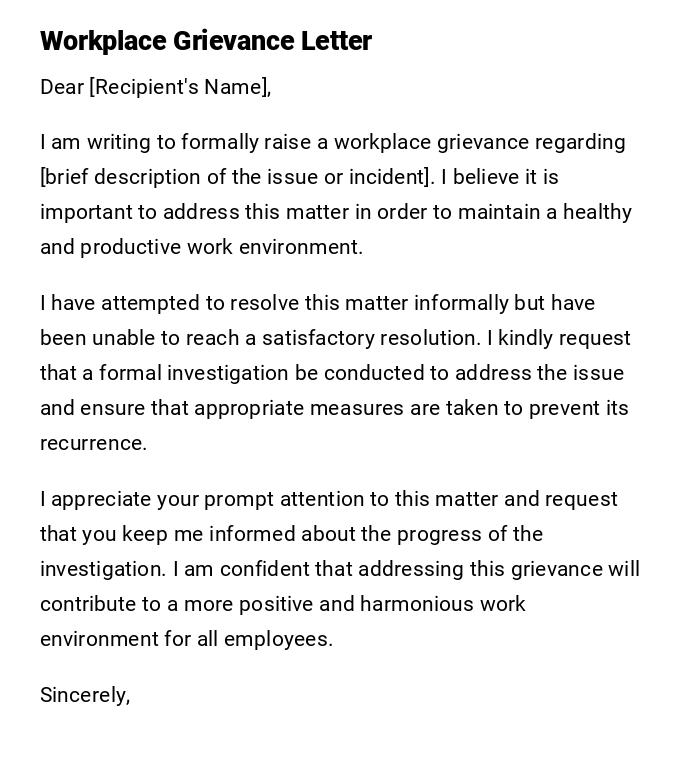
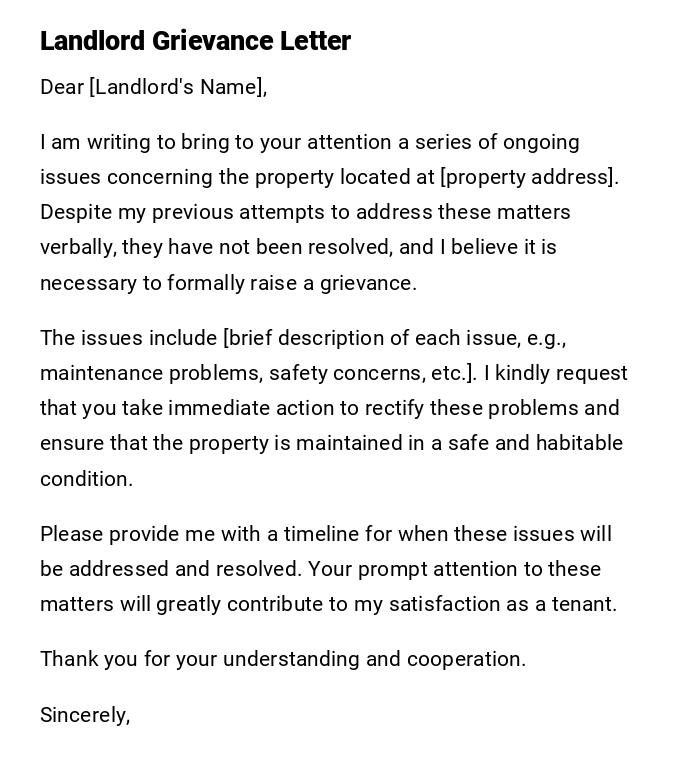
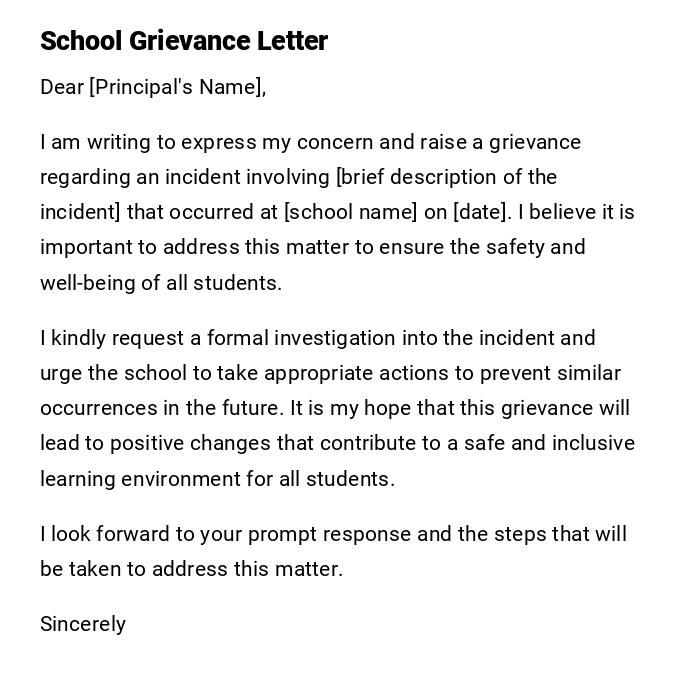
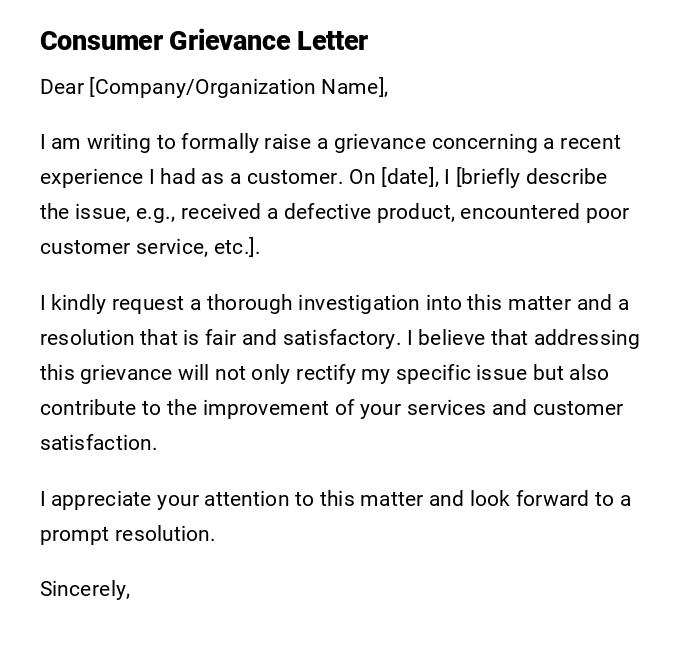
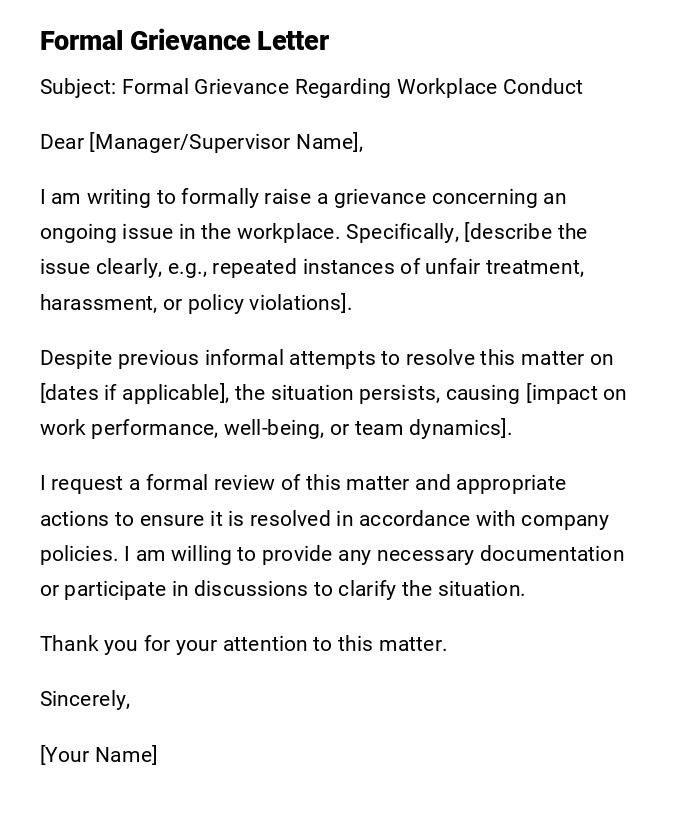
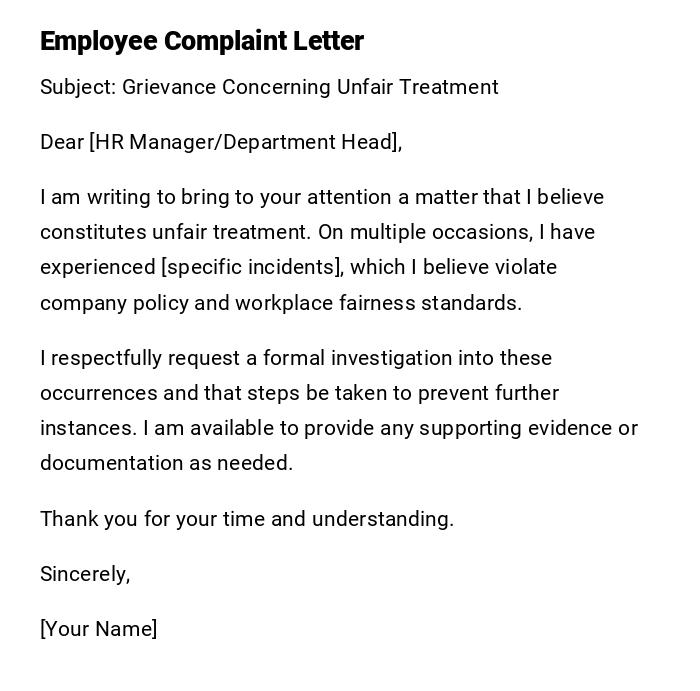
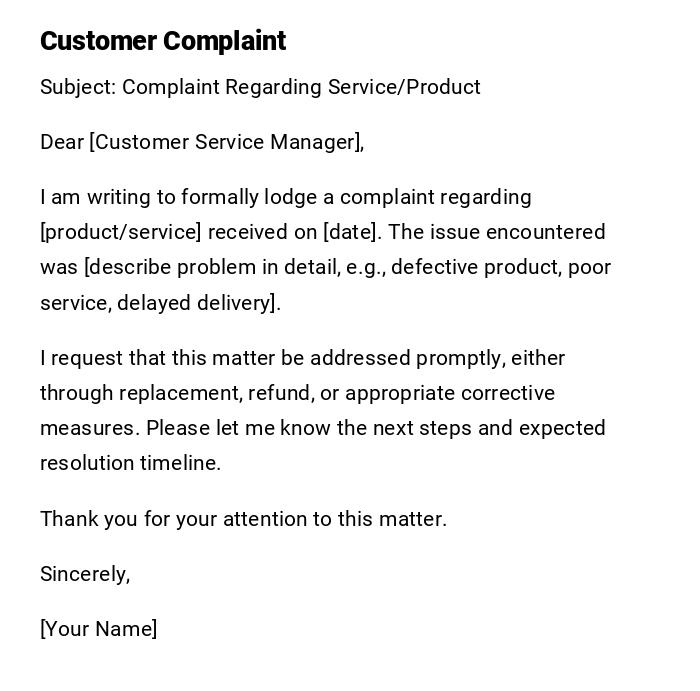
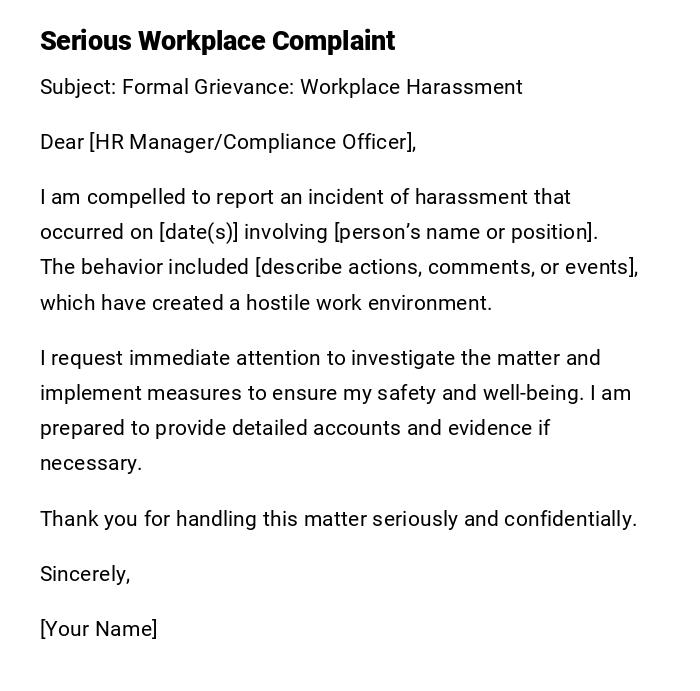
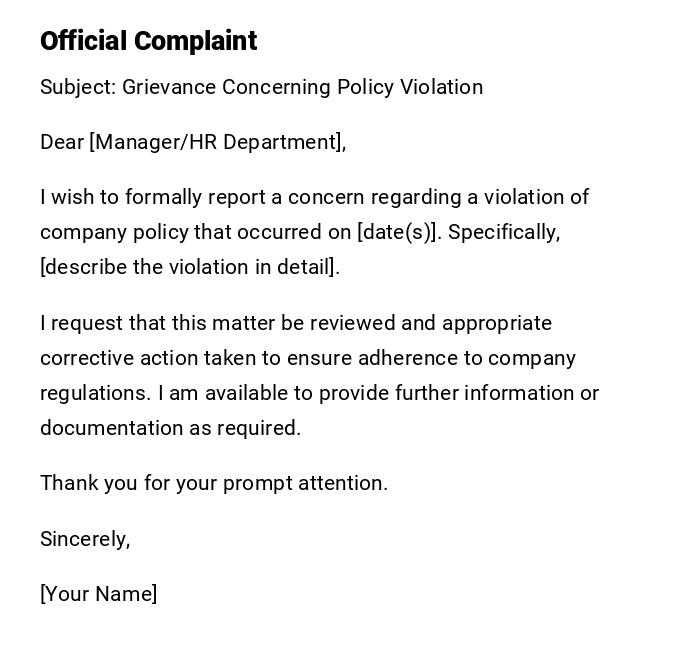
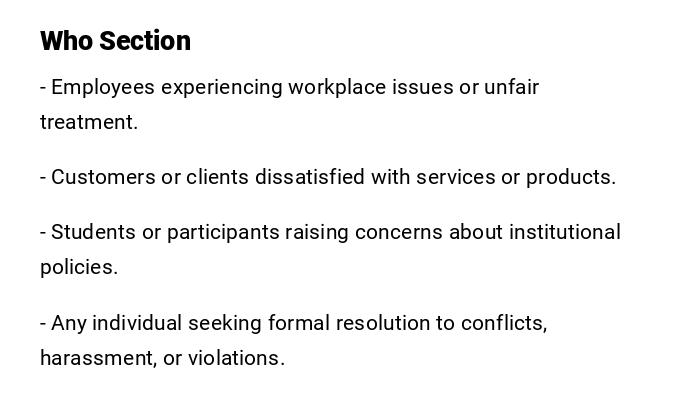

 Download Word Doc
Download Word Doc
 Download PDF
Download PDF